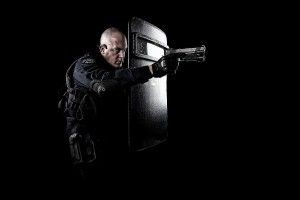CA cops could get more mental illness training
by James Poulos | May 16, 2015 6:12 am
 [1]A recent pair of LAPD confrontations ending in death gave new life to a pair of state Senate bills that would increase mental illness training for California police.
[1]A recent pair of LAPD confrontations ending in death gave new life to a pair of state Senate bills that would increase mental illness training for California police.
Introduced last year, Senate Bill 11, the first, has begun to gather steam as lawmakers have fleshed out the legislation with more specific provisions. The bill would mandate[2] a basic training course on how to recognize and de-escalate conflict involving “persons with mental illness or intellectual disability who are in crisis,” upping substantially the hours of education required for cops.
“The bill would require that this evidence-based behavioral health classroom training course be 20 hours long and be in addition to the basic training course’s current hour requirement,” according to the language of SB11, which would also require ongoing updates to the course as part of so-called “perishable skills training.”
SB11 has taken on a new relevance as the Senate Select Committee on Mental Health held a special hearing in L.A.’s Exposition park. As the Sacramento Bee reported[3], lawmakers called on “current and former law enforcement officers from the CHP, the San Diego Police Department and the Los Angeles County Sheriff’s Department, as well as representatives of Disability Rights California and the National Alliance on Mental Illness.” State Sen. Holly Mitchell, D-Los Angeles, took the opportunity to voice her support for SB11, along with SB29[4], a similar bill initially introduced, like SB11, by state Sen. Jim Beall, D-San Jose.
A pattern of shootings
After a brutal CHP beating of a mentally ill 51-year-old woman this July, advocates have been up in arms against what they identify as a pattern of police abuse. Those tensions spilled over as, over the past two months, L.A. saw cops shoot dead two homeless men. Both Charly Keunang of Skid Row and Brendon Glenn of Venice were “combative, but not armed,” NBC Los Angeles reported. “Keunang had been diagnosed with mental illness while in prison. Glenn suffered from alcohol abuse, according to those who knew him. Both cases remain under investigation.”
A contentious town hall meeting in L.A.’s Venice neighborhood that focused on Glenn’s death drew a powerful wave of criticism as Police Chief Charlie Beck and Mayor Eric Garcetti both opted not to attend. “Several people who attended Thursday night’s meeting faulted Beck and Mayor Garcetti for not being there,” the Los Angeles Times reported[5]. “Beck rebuffed the criticism of the mayor, saying it was ‘unfair’ because previous mayors hadn’t attended similar events in the past.”
Although California police face thousands upon thousands of situations involving the mentally ill, only a relative handful have recently culminated in police shootings. Nevertheless, the pattern of outcomes that has emerged this year put the California Highway Patrol and the Los Angeles Police Department on the defensive.
“Every year, the Los Angeles Police Department responds to some 14,000 calls for service involving mentally disturbed individuals,” LAPD Lieutenant Brian Bixler, officer in charge of the Crisis Response Support Section, told[6] NBC Los Angeles. The share of ensuing events involving police violence and mental health problems has been massive, the network reported.
“Encounters with the mentally ill, or those affected by substance abuse, account for a disproportionate number of the uses of force by the Los Angeles Sheriff’s Department” — around 40 percent, as Sheriff Jim McDonnell told the Select Committee.
A statewide challenge
Observers have warned that law enforcement troubles with mentally ill individuals have arisen in part because of California’s failure to adequately house them. According[7] to the Marin Independent Journal, in 1960, “California had a population of 15 million and 37,000 mental hospital beds; by 2010, the state’s population had grown to 37 million and there were only 4,000 mental hospital beds.”
- [Image]: http://calwatchdog.com/wp-content/uploads/2015/05/cops-police-lapd.jpg
- mandate: http://www.leginfo.ca.gov/pub/15-16/bill/sen/sb_0001-0050/sb_11_bill_20150226_amended_sen_v98.html
- reported: http://www.sacbee.com/news/politics-government/capitol-alert/article20458992.html
- SB29: http://www.sanjoseca.gov/DocumentCenter/View/41959
- reported: http://www.latimes.com/local/lanow/la-me-ln-lapd-chief-absence-venice-20150511-story.html
- told: http://www.nbclosangeles.com/news/local/Advocates-Urge-More-Training-to-Better-Prepare-Law-Enforcement-for-Encounters-with-the-Mentall-Ill-303159981.html
- According: http://www.marinij.com/general-news/20150430/newly-formed-marin-coalition-calls-for-mandatory-treatment-of-mentally-ill-in-marin
Source URL: https://calwatchdog.com/2015/05/16/ca-cops-get-mental-illness-training/